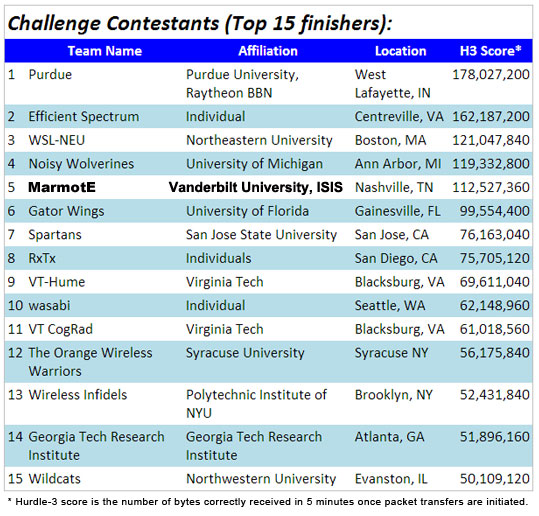A team of engineers from Vanderbilt’s Institute for Software Integrated Systems is one of 15 teams competing in the Defense Advanced Research Projects Agency (DARPA) Spectrum Challenge.
The DARPA Spectrum Challenge is a competition to demonstrate a radio protocol that can best use a given communication channel in the presence of other dynamic users and interfering signals.
Of the 90 teams participating in the recent qualifying phase, 46 finished all three hurdles and the top 15 were selected to enter the tournament, which will entail head-to-head competitions between qualified teams’ radio protocols in a structured testbed environment as well as collaborative competitions.
Preliminary Challenge and Final Challenge events will take place at DARPA in Arlington, Va., in September. Winners of each tournament will receive cash prizes. The total of all cash prizes is $150,000.
 Peter Volgyesi, research scientist at ISIS, is leader of Vanderbilt’s MarmotE team. Members are Peter Horvath, a postdoctoral scholar, Sandor Szilvasi and Benjamin Babjak, electrical engineering graduates students and research associates at ISIS, and Miklos Maroti, visiting professor at ISIS from the University of Szeged, Hungary.
Peter Volgyesi, research scientist at ISIS, is leader of Vanderbilt’s MarmotE team. Members are Peter Horvath, a postdoctoral scholar, Sandor Szilvasi and Benjamin Babjak, electrical engineering graduates students and research associates at ISIS, and Miklos Maroti, visiting professor at ISIS from the University of Szeged, Hungary.
Developing new techniques for assured communications in dynamic environments is a necessity for military and first responder missions. “We have created a head-to-head competition to see who can transmit a set of data from one radio to another the most effectively and efficiently while being bombarded by interference and competing signals,” said Yiftach Eisenberg, DARPA program manager in a statement. “To win this competition teams will need to develop new algorithms for software-defined radios at universities, small businesses and even on their home computers,” Eisenberg said.
The DARPA competition is very well aligned with the doctoral research topic of the two graduate students on the team, Volgyesi said.
“Two ongoing National Science Foundation projects support our graduate students and are essential to build up the software-defined radio knowhow,” said Volgyesi, who is the principal investigator along with Akos Ledeczi, associate professor of electrical engineering, on both: NeTS: Experimental Platform for Low-Power Wireless Networking Research (#0964592), and Self-Sustaining CPS for Structural Monitoring (#1035627).
“In our NSF-NeTS project we are building a new low-power, software-defined radio platform called MarmotE. The ‘E’ stands for energy. The power savings is achieved with deep sleep periods of the node, hence the Marmot [large hibernating ground squirrel] part,” Volgyesi said.
The MarmotE team plans to travel to Arlington for the preliminary tournament.
Read more about security research underway at Vanderbilt’s School of Engineering.